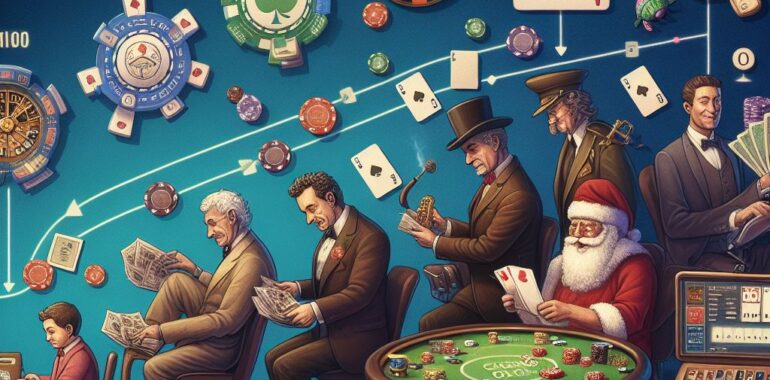The Evolution of Casino Poker: From Origins to Online

The Evolution of Casino Poker: From Origins to Online
Poker’s journey from a humble card game to a global phenomenon encapsulates a tale of evolution, innovation, and the relentless pursuit of strategic excellence.From Origins to Online This evolution has seen poker morph through various forms, from its early days in smoky saloons to the digital tables of the online world. This article explores the pivotal moments in the history of casino poker, charting its growth from origins to the online era.
Origins: The Birth of Poker
The origins of poker are somewhat murky, with influences drawn from various card games spanning several continents. However, it was in the United States, particularly in the Mississippi River region in the early 19th century, that poker began to take its modern form. These early games were simplistic, yet they laid the foundation for the complex and strategic game we know today.
The Golden Era: Poker Takes Center Stage
Poker’s golden era can be traced back to the days of the Wild West, where it became a staple of frontier life. Saloons across American towns hosted poker games, with the game becoming synonymous with the cowboy lifestyle. The introduction of the World Series of Poker (WSOP) in 1970 marked a turning point, turning poker into a competitive sport and introducing it to a broader audience.
Casino Domination: The Rise of Poker Rooms
The latter half of the 20th century saw poker rooms becoming a mainstay in casinos worldwide. Las Vegas, in particular, became the epicenter of poker, with casinos dedicating entire floors to the game. The 1980s and 1990s saw an increase in poker’s popularity, with major tournaments and televised events bringing the game into living rooms across the globe.
The Online Revolution: Poker in the Digital Age
The advent of the internet revolutionized many aspects of daily life, and poker was no exception. The late 1990s and early 2000s saw the birth of online poker, allowing players to compete against each other from the comfort of their homes. This era also introduced innovative formats like Texas Hold’em, which became the game’s most popular variant.
The online poker boom of the early 2000s, fueled by Chris Moneymaker’s historic win at the 2003 WSOP, catapulted poker to unprecedented levels of popularity. Online platforms democratized the game, offering tools and resources that helped nurture a new generation of poker talent.
The Impact of Technology: AI and Beyond
The evolution of poker has also been significantly influenced by advancements in technology. Artificial intelligence, in particular, has made strides in understanding and strategizing the game, challenging human players in ways previously unimaginable. These technological advancements have not only changed how games are played but also how they are studied and understood.
The Future: Blending the Physical and Digital
Today, poker enjoys a dual existence, thriving both in the plush poker rooms of casinos and on the digital platforms of the online world. The future of poker seems to be a blend of these realms, with live poker events incorporating online elements and virtual reality technology promising to bring a more immersive experience to online play.
Conclusion
The evolution of casino poker from origins to online is a testament to the game’s enduring appeal and adaptability. Poker has not only survived but thrived through various cultural and technological shifts. As we look toward the future, one thing is clear: poker will continue to evolve, adapt, and enchant players around the world, irrespective of the medium through which it is played.